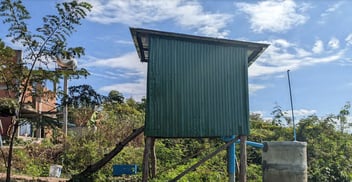Sewer blockages increase following COVID-19 toilet paper shortage
Water utilities across Australia are reminding people about the dangers of flushing wet wipes and other products down the toilet, as an increase in blocked pipes since the initial COVID-19 toilet paper shortage hinders wastewater networks.
Following a five-week stint of blockages in pumps and screening equipment resulting from flushed paper towel and wet wipes, New South Wales utility Hunter Water launched an awareness campaign asking customers to ‘Respect the Throne’.
Hunter Water Acting Executive Manager Service Delivery for Customers, Glen Robinson said the utility had removed 22 tonnes of 'fatberg' from its Morpeth wastewater treatment plant since the start of March.
“We understand our customers may be feeling frustrated if they can’t purchase toilet paper ... but it’s really important that if they need to use anything else, then they should bag and bin it instead," he said.
“Products such as paper towel, tissues and wet wipes don’t break down quickly enough in water and can cause large, expensive blockages in our wastewater system or in a customer’s own pipes at their cost and inconvenience."
Queensland’s Urban Utilities and its maintenance providers have also warned of the costly dangers of flushing products other than toilet paper, with the number of blocked drains crews attended in the past two weeks skyrocketing.
“Usually we’re called out to around seven blockages a week, but at the moment we’re dealing with more than 20 a week,” RTL Trades General Manager Mick Bradley said.
“The majority of blocked drains are caused by people flushing wipes down the toilet and the costs can run into the thousands. At a minimum, you’ll be looking at around $400 to $500 to have a CCTV inspection carried out and the blockage cleared.”
Urban Utilities spokesperson Michelle Cull said wet wipes were also hitting its treatment plants and pump stations.
“One of the most shocking sights is the huge volume of wipes we’re removing from the screens at our pump stations every day,” she said.
“The problem with wet wipes, tissues and paper towels is they don’t disintegrate quickly after they’re flushed. With the toilet paper shortage continuing, it’s more important than ever to only flush the Three Ps – pee, poo and paper.”
Meanwhile, Yarra Valley Water (YVW) has called on Melburnians to be mindful of what they flush after a 42-tonne ‘fatberg’ was discovered in the utility’s network.
The enormous fatberg, which weighed more than an average petrol tanker, took workers nine hours to dislodge and remove from the sewer.
YVW Managing Director Pat McCafferty said the incident was an indication that the community needed to be reminded that wet wipes and anything other than toilet paper should not be flushed.
“People often buy wet wipes in good faith thinking that they are flushable as advertised,” McCafferty said.
“In fact, they don’t break down in the sewer system and can create expensive plumbing problems for customers, sometimes up to $1000.
“If things keep going as they are, over the next six months we’re looking at increased maintenance costs of up to $1.6 million for repairing the damage caused by sewer blockages and fatbergs.”
Our wastewater crews are dealing with more pipe blockages than usual, up 29% from March to April! A large portion included flushed items like wet wipes and tissues, which can’t easily break down in water. Do the right thing and only flush toilet paper, pee or poo. #HealthySewers pic.twitter.com/tZByUqAgTQ
— SA Water (@SAWaterCorp) May 13, 2020
In South Australia, SA Water has recorded a 29% increase in the number of blockages within its 9000 km of sewer mains.
SA Water Customers, Strategy and Innovation General Manager Anna Jackson said the utility spends hundreds of thousands of dollars each year removing items like wet wipes from its pipes and wastewater treatment plants.
“If you flush anything other than the three Ps ... down the toilet, or put food scraps and cooking oils down the kitchen sink, they can cause a blockage in your own internal plumbing,” Jackson said.
“We understand some people may have been unable to buy toilet paper and needed to use another household item to clean up, however, unlike toilet paper, which is deliberately designed to break down in around 30 seconds, these other items don’t disintegrate in the sewer system.
“If you must resort to using a toilet paper alternative, we recommend having a small bin in the toilet or bathroom for easy disposal.
“We recognise that a wide scale shift in people’s flushing behaviours will take time, but we’re encouraged by the feedback we continue to receive from customers in response to our calls to only flush the three Ps.”

